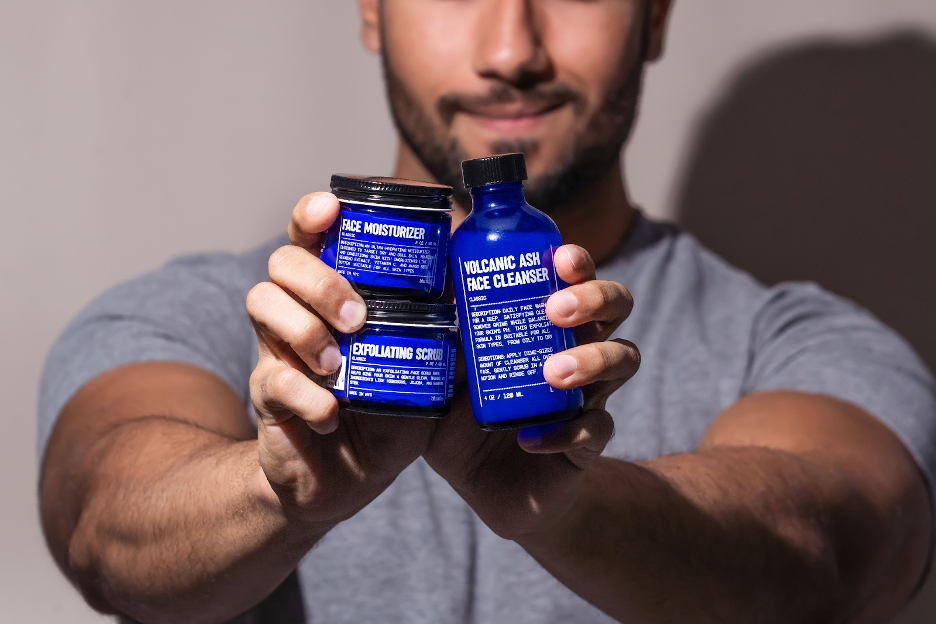Vegan skincare products have been sweeping the beauty industry. As people learn more about products that use animal-derived ingredients, they realize the many benefits of switching to vegan skincare.
We’re here to reveal all the industry secrets about regular face creams and explain why you should switch to a cruelty-free, vegan face moisturizer that’s better for your skin.
What is Vegan Face Moisturizer?
Vegan face moisturizer is a hydrating product for your skin that contains no animal materials or animal-derived ingredients. Vegan skincare products, like face cream, are designed to moisturize the skin without using ingredients like beeswax, lanolin, collagen, or other substances that come from animals.
Instead of animal ingredients, vegan face moisturizers use gentle, plant-based ingredients like oils, butters, and extracts as the main moisturizing agents in their formulas.
The Ugly Truth about Traditional Face Creams
Most “regular” skincare products use substances from animals, and the worst part… they’re not cruelty-free. That’s why it’s so important to use vegan products. They’re better for your skin and the environment—and they’re better for animal welfare.
We recommend looking for products labeled vegan and cruelty-free. It’s an easy way to prioritize the health of animals, the environment, and your skin.
How to Choose a Vegan Face Moisturizer
Here are the top tips for choosing a vegan face moisturizer:
Know Your Skin Type
Understanding your skin type is essential when building your skincare routine. Whether you have a simple three-step regimen or a four-step targeted acne treatment, using the right products for your skin type and concerns makes all the difference.
There are five main skin types: oily, combination, sensitive, dry, and normal. You’ll want to find a face moisturizer that targets your concerns and contains ingredients that work well for your skin.
Ingredients to Look for in Vegan Face Moisturizers
Vegan skincare products are made with nourishing, plant-based ingredients that are wonderful for your skin. Look for products that use ingredients to treat your specific skin concerns, such as acne, hyperpigmentation, and more.
Here are a few ingredients to look for in vegan face moisturizer:
- Plant oils: Argan, marula, jojoba, rosehip seed, grapeseed, avocado, apricot kernel, evening primrose, coconut, olive, and almond.
- Plant butters: Shea, cocoa, mango avocado, cupuacu, kokum, illipe, and murumuru.
- Humectants: Glycerin, aloe vera, and honey.
- Emollients: Plant-derived fatty alcohols, squalane, esters, and waxes.
- Botanical extracts: Green tea, chamomile, aloe vera, chamomile, calendula, hibiscus, rose, lavender, lemongrass, and cucumber.
Avoid Harsh Ingredients
You should always avoid harsh chemicals regardless of skin type or concerns. The good news is that vegan self-care products typically remove many harsh materials that cause irritation, like redness or dry, flaky skin.
To be on the safe side, we recommend checking for common irritants. Common ingredients to avoid include parabens, phthalates, sulfates, and artificial fragrances or dyes.
How to Incorporate a Vegan Face Moisturizer into Your Skincare Routine

Adding a vegan face moisturizer to your morning or evening skincare routine is simple. The tricky part is finding a product you like. Here's a sample skincare regimen using Blu Atlas products.
Blu Atlas products are vegan, cruelty-free, and free from harsh ingredients like parabens, sulfates, phthalates, and artificial fragrances. Each formula is crafted with naturally derived ingredients that offer skin-supporting benefits that make skin healthier and more radiant.
Step One: Cleansing
Grab a dime-sized amount of the Volcanic Ash Face Cleanser. Gently rub it all over the face, using a bit of water to ensure it spreads evenly over the skin. Use gentle circular motions to ensure it cleanses your face. Rinse off with lukewarm or cool water, then pat the face dry before proceeding.
Step Two: Targeted Treatments
Depending on your skin type and concerns, you may want to use targeted treatments before moisturizing. The American Academy of Dermatology recommends applying medication or treatment products after cleansing and before using moisturizer.
Use a brightening tool like Vitamin C Serum or treat areas around your eyes with a Restorative Eye Stick. It’s also a great time to apply other elixirs like treatments for acne, hyperpigmentation, or anti-aging products.
Step Three: Moisturizing
Now it’s time to apply your vegan Face Moisturizer. Scoop up a dime-sized amount of product and gently spread it over the face. Ensure it’s evenly distributed and allow it to soak into the skin before going to the next step.
Step Four: Sunscreen
If you’re following a skincare routine in the morning, always follow up with sunscreen with SPF 15 or higher (30 or higher if spending time outdoors). The Skin Cancer Foundation recommends using a broad-spectrum formula on all areas of exposed skin.
If you’re looking for a simple way to build a skincare routine without researching every product, try Blu Atlas’s Basic Bundle or Advanced Skincare Kit.
Frequently Asked Questions
What is a plant-based moisturizer?
Plant-based self-care products are made with plant oils and extracts. Plant-based moisturizers are designed to hydrate and nourish the skin with a formula made from plant materials and no animal-derived ingredients.
What is the best face moisturizer for aging skin?
For aging skin, look for a face moisturizer with hydrating ingredients like glycerin and hyaluronic acid, plus antioxidants, retinol or bakuchiol, peptides, ceramides, and broad-spectrum SPF 30+ sun protection in a non-comedogenic, fragrance-free formula.
